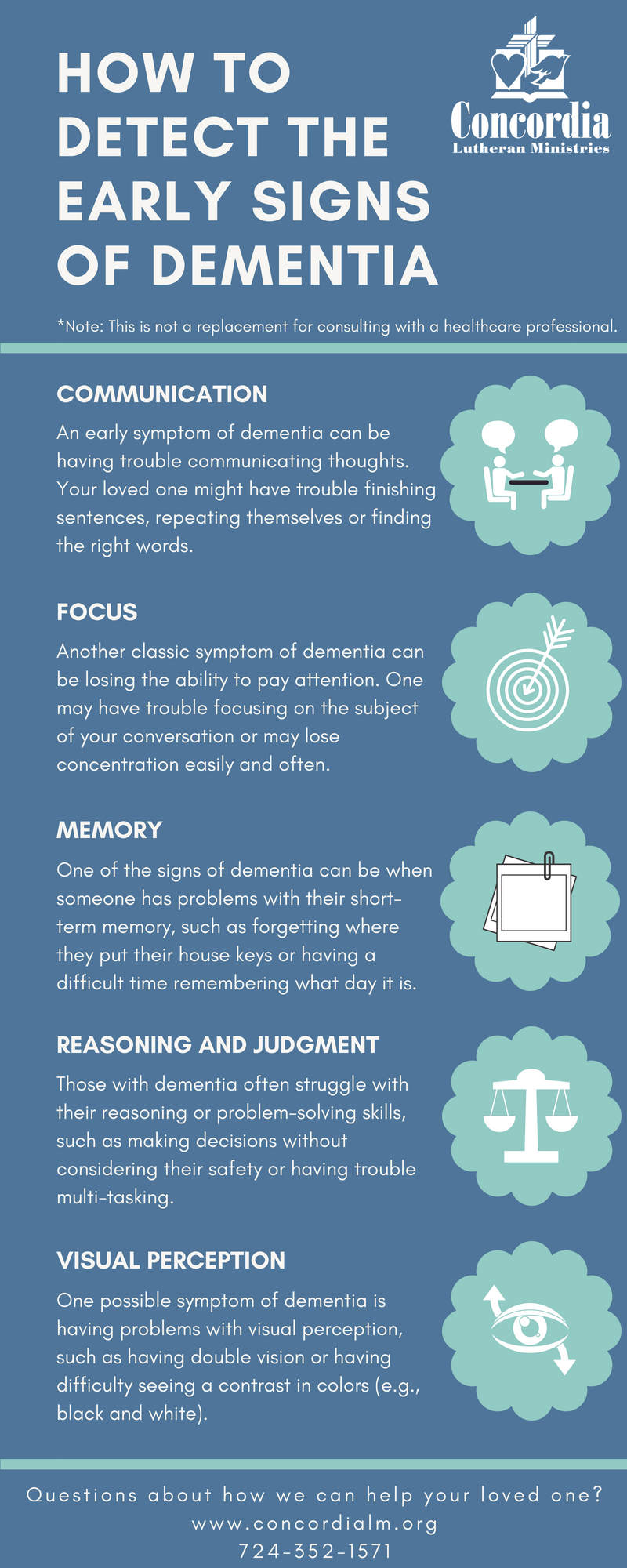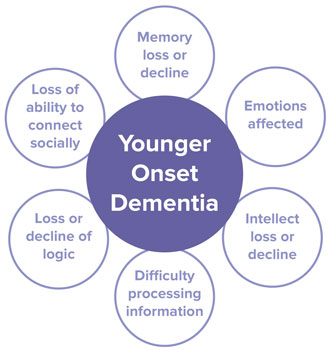Coping Strategies for Families Facing Frontotemporal Dementia
Coping Strategies for Families Facing Frontotemporal Dementia
Blog Article
Recognizing the Impact of Dementia on Day-to-day Live and Caregiving
Mental deterioration affects every day life in extensive ways, influencing not simply those detected but also their caregivers. As cognitive decrease advances, you could see changes in interaction and regular that obstacle both celebrations. Comprehending these changes is crucial for keeping dignity and interaction. But exactly how do you adjust your caregiving techniques to sustain someone traversing this complicated trip? The solutions might stun you as we explore the subtleties of this experience.
The Stages of Dementia and Their Results on Life
As you navigate the journey of dementia, understanding its stages can noticeably influence exactly how you handle everyday life. Mental deterioration typically proceeds via 3 primary stages: early, center, and late.
Throughout the center stage, you'll experience much more visible cognitive decline. Daily jobs could end up being difficult, and preserving your independence might call for modifications. Utilizing reminders and streamlining your setting can assist.
In the late stage, people usually require considerable help with everyday activities. Preparation for care becomes essential, concentrating on comfort and quality of life. By understanding these phases, you're better equipped to react proactively, ensuring you or your enjoyed one can navigate the challenges with self-respect and poise.

Adjustments in Communication and Social Interaction
How do changes in communication affect your day-to-day communications as dementia progresses? As dementia advances, you could see that straightforward discussions end up being tough. Words may leave you, or you may battle to locate the appropriate expressions. This can lead to stress for both you and your loved ones. Nonverbal hints, like gestures or face expressions, end up being progressively important.
You may discover it simpler to link via these means instead of counting exclusively on talked language. Listening abilities can additionally alter; you might locate it harder to keep in mind or adhere to conversations what was simply said (Fall Risk). This can bring about misconceptions or feelings of isolation
Urging persistence and developing a supportive environment can aid. Participating in activities that promote link, like music or art, can enhance social communications. Bear in mind, preserving connections is still feasible; it's simply about adapting to new methods of interacting.
Influence On Daily Routines and Activities
While navigating everyday regimens, you'll likely see that tasks you once completed effortlessly ended up being a lot more tough as mental deterioration progresses. Easy activities like cooking, dressing, or even showering might need even more time and initiative. You may locate yourself failing to remember actions in familiar regimens or battling to recall where you positioned things. This can cause disappointment not just for you, yet likewise for those around you.
Adapting your setting can help; for instance, identifying items or making use of checklists can streamline tasks. Involving in repetitive, organized activities can additionally offer convenience and a sense of success. Keep in mind, it's all right to ask for aid.
Behavior and psychological Difficulties
Guiding through day-to-day regimens can bring around not just practical difficulties, yet behavioral and also psychological ones. You might discover adjustments in mood, such as boosted anxiety or frustration, which can stem from confusion or problem in completing tasks. As you browse these minutes, it is essential to acknowledge that your enjoyed one might share their sensations with habits like anxiety or withdrawal.
These psychological actions can be uncertain and may occur without caution, leaving you both feeling overwhelmed. You could find that acquainted atmospheres or routines can help lower anxiety, yet keeping persistence ends up being significant. It is very important to verify their feelings, even if you don't totally recognize them.
The Duty of Caregivers in Supporting People With Mental Deterioration
As a caregiver, you play a necessary duty in providing emotional support for individuals with dementia. Establishing daily care routines can produce a sense of stability and comfort, helping to relieve their stress and anxiety. By recognizing their demands and making use of reliable methods, you can greatly boost their lifestyle.
Psychological Assistance Approaches
When caring for somebody with dementia, recognizing the emotional landscape is essential for giving efficient assistance. Easy motions, like holding their hand or preserving eye contact, can produce a feeling of safety. Ultimately, do not neglect to take care of your very own emotional needs; seeking assistance for yourself can improve your capacity to care for them.
Daily Care Routines
Developing daily treatment regimens is necessary for providing stability and convenience to people with dementia, as these routines can help in reducing complication and anxiety. You can start by detailing a regular schedule for meals, activities, and remainder. This predictability helps your loved one feel a lot more secure and engaged.
Integrate acquainted tasks, like folding washing or watering plants, which can stimulate favorable memories and foster a sense of accomplishment. Use visual hints, such as lists or schedules, to lead them via the day.
Be flexible, though; adapt routines as needed based on their mood or energy levels. Vascular Dementia. Remember, your patience and understanding are vital in maneuvering their changing needs, ensuring they feel supported and valued throughout their daily life
Creating a Safe and Comfortable Living Setting
Developing a secure and comfortable living setting is necessary for people with mental deterioration. You'll want to make home security alterations that lower risks and guarantee experience to provide a sense of convenience. By focusing on these aspects, you can help produce an area that supports both safety and wellness.
Home Safety And Security Adjustments
As you navigate the difficulties visit homepage of mental deterioration, making home security alterations can significantly enhance convenience and protection. Label crucial locations, such as the restroom and kitchen area, with clear indicators to help with alignment. These modifications not only advertise safety and security but likewise motivate freedom, allowing your enjoyed one to really feel even more at convenience in their environment.
Comfort and Experience
After making certain a safe atmosphere with required alterations, cultivating comfort and familiarity is essential for individuals with dementia. Begin by customizing their room. Usage acquainted colors, decorations, and photographs that evoke pleased memories. A preferred blanket or chair can give a feeling of safety and security. Preserve a constant regular to assist them really feel based and lower anxiousness. Easy, familiar dishes can also produce a soothing atmosphere. Keep pathways clutter-free and clear to stay clear of complication. Include soft lights, as brilliant lights can be disorienting. Think about including calming aromas, like lavender, to advertise relaxation. Involving in familiar Continued activities, such as paying attention to songs or horticulture, can improve their sense of belonging, making their living environment a true shelter.
Strategies for Reliable Caregiving and Assistance
While maneuvering the obstacles of mental deterioration care can really feel overwhelming, implementing reliable techniques can greatly boost both the caregiver's and the person's everyday experience. Start by establishing a regimen; predictability helps in reducing anxiety for both you and your enjoyed one. Use clear, easy communication-- direct inquiries and brief sentences can stop complication.

Don't forget to deal with yourself; timetable breaks and connect with support system. Sharing experiences with others in similar scenarios can supply important understandings and psychological relief.
Lastly, stay client and versatile. Dementia can bring uncertain modifications, so adjusting your method is vital. By utilizing these strategies, you can cultivate a more favorable setting that benefits both you and your loved one.
Regularly Asked Questions

What Are the Different Sorts Of Dementia?
You'll find several kinds navigate to this website of mental deterioration, consisting of Alzheimer's, vascular dementia, Lewy body dementia, and frontotemporal mental deterioration. Each kind impacts memory and cognitive feature in different ways, so recognizing the differences is vital for proper diagnosis and treatment.
Exactly How Can I Help Someone With Early-Stage Mental Deterioration?
You can aid somebody with early-stage dementia by being patient, supplying assistance, and encouraging them to take part in tasks they delight in. Maintaining routines regular and preserving open communication can additionally make a considerable difference in their every day life.
Are There Financial Resources Available for Dementia Care?
Yes, there are monetary resources readily available for dementia treatment. You can explore entitlement program programs, nonprofit companies, and insurance alternatives. It's likewise smart to seek advice from local firms for particular sources tailored to your circumstance.
What Legal Factors To Consider Should Caregivers Be Aware Of?
As a caretaker, you should take into consideration power of attorney, health care proxies, and guardianship laws. It's important to understand the legal civil liberties and responsibilities you hold, guaranteeing your liked one obtains appropriate care and protection.
How Can I Handle Caretaker Anxiety?
You can handle caregiver tension by focusing on self-care, looking for support from close friends or teams, establishing practical assumptions, taking breaks, and exercising relaxation techniques. Bear in mind, your well-being matters equally as high as the individual you're caring for.
Understanding the Impact of Dementia on Daily Life and Caregiving.
As you navigate the journey of dementia, recognizing its stages can markedly influence exactly how you take care of day-to-day life.While maneuvering day-to-day routines, you'll likely discover that tasks you once completed easily come to be more challenging as dementia progresses.Establishing everyday care routines is necessary for giving security and convenience to people with dementia, as these routines can aid reduce confusion and anxiety.While maneuvering the challenges of mental deterioration treatment can really feel frustrating, executing efficient techniques can considerably enhance both the caregiver's and the client's daily experience.
Report this page